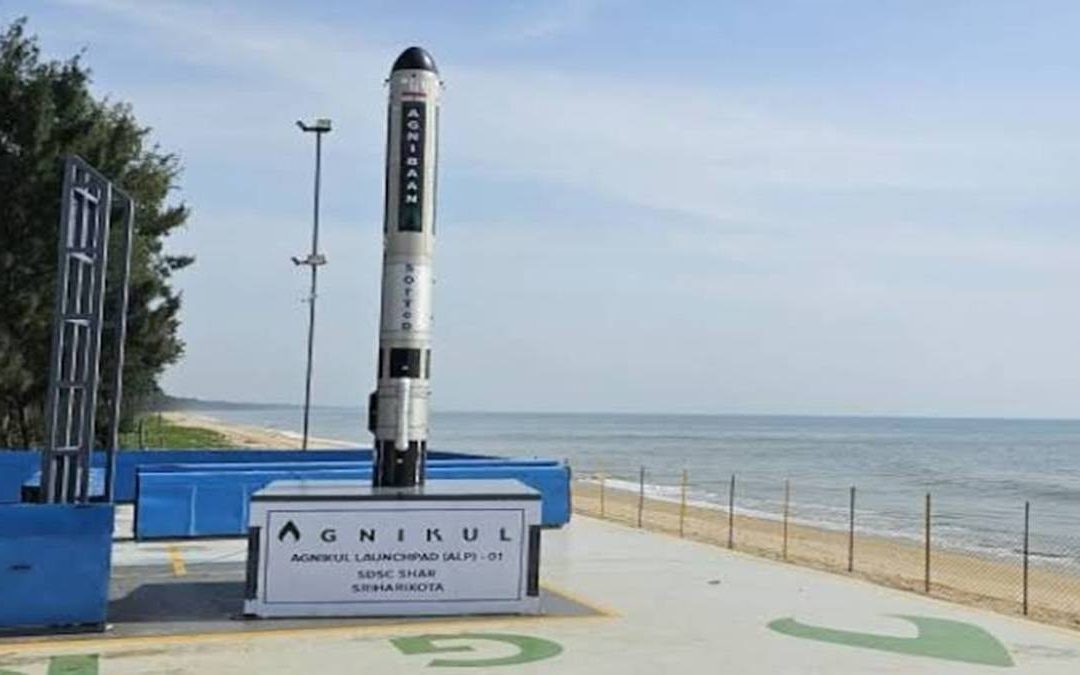After four failed attempts, AgniKul Cosmos, a startup incubated at IIT Madras, achieved a historic milestone on Thursday by launching the world’s first single-piece 3D printed rocket engine, designed and built indigenously. With support from ISRO, the startup successfully conducted a sub-orbital test flight of its home-built rocket, Agnibaan, at 7:15 am from Sriharikota.
Not only is it the world’s first 3D printed engine, but Agnibaan SOrTeD also boasts several other firsts, including being the first semi-cryogenic engine-powered rocket launch and India’s first rocket launch from a private launchpad. Agnibaan is powered by India’s only rocket engine that uses both gas and liquid fuel (liquid oxygen/kerosene).
“Humbled to announce the successful completion of our first flight – Mission 01 of Agnibaan SOrTeD – from our own and India’s first & only private Launchpad within SDSC- SHAR at Sriharikota. All the mission objectives of this controlled vertical ascent flight were met and performance was nominal. The vehicle was completely designed in- house and was powered by the world’s first single piece 3d printed engine and also happens to be India’s first flight with a semi cryo engine. Our greatest thanks to INSPACeIND, ISRO, IIT-Madras & our incredibly committed team in helping us prove that a private player can design and fly original space tech hardware in India. MadeInIndiaForTheWorld,” AgniKul stated in a post.
Agnibaan is a two-stage rocket capable of carrying up to 300 kg to an altitude of 700 km. The test flight aimed to demonstrate the in-house and homegrown technologies, gather crucial flight data, and ensure the optimal functioning of systems for AgniKul’s orbital launch vehicle, Agnibaan. It can access both low and high-inclination orbits and is designed to be completely mobile, capable of accessing more than 10 launch ports.
AgniKul’s core team members were present during the launch, including Prof. Satyanarayanan R Chakravarthy, Founding Advisor, AgniKul Cosmos and Faculty, Department of Aerospace Engineering, IIT Madras, Srinath Ravichandran, co-founder and CEO, AgniKul Cosmos, Moin SPM, co-founder and COO, AgniKul Cosmos, Saraniya Periaswamy, Vehicle Director, Agnibaan SOrTeD, and Umamahesw K, Project Director, Mission-01 and Agnibaan SOrTeD.
“We are proud to present India’s first semi-cryogenic rocket engine, which is also the world’s most integrated single-shot 3D printed piece. It signifies our ability to rapidly assemble rockets in a way that is unparalleled,” said Satyanarayanan R Chakravarthy, Founding Advisor, AgniKul Cosmos, and head of the National Centre for Combustion Research and Development (NCCRD) at IIT Madras.
ISRO lauded the launch, stating, “A major milestone, as the first-ever controlled flight of a semi-cryogenic liquid engine realised through additive manufacturing,” on social media platform X. ISRO Chairman S Somanath congratulated AgniKul Cosmos, emphasizing that the success demonstrates the prowess of indigenous design and innovation and motivates ISRO to support space startups and non-governmental entities.
Pawan K Goenka, chairman of the Indian National Space Promotion and Authorization Center (IN-SPACe), also hailed the achievement as a historic moment. The Indian Space Association (ISpA) noted that the launch would bolster global confidence in the country’s private space industry.
Founded in 2017, AgniKul runs India’s first private launchpad and mission control center. AgniKul is now the second private company to launch a rocket in India, following Skyroot’s success in 2022. The company aims to conduct an orbital mission by the end of the financial year 2025 and is working with customers for regular flights starting from CY 2025.
Union Minister, Rajeev Chandrasekhar also congratulated AgniKul Cosmos for successfully completing its first launch from AgniKul’s private launchpad within SDSC-SHAR, Sriharikota. “Congratulations @AgnikulCosmos @iitmadras Agnikul successfully completed its first launch from Agnikul’s own & India’s only private Launchpad within SDSC-SHAR. Besides being the world’s first flight with a single piece 3D printed rocket engine, this controlled flight is also India’s first flight with a semi cryogenic engine. The vehicle was completely designed in-house in India and assembled at Agnikul’s facilities within IIT Madras,” Chandrasekhar posted on X.
Prime Minister, Narendra Modi has been pushing for the privatization and commercialization of the country’s space sector, opening up opportunities for the Indian private sector through space reforms introduced in 2020.






